_600.jpg) |
| Michael Almereyda with Hampton Fancher on the form of Escapes, executive produced by Wes Anderson: "This is my tribute to Bruce Conner." Photo: Anne-Katrin Titze |
In my Escapes conversation with Michael Almereyda (Experimenter, starring Peter Sarsgaard) and Hampton Fancher (co-screenwriter of Blade Runner and Blade Runner 2049) we start out with Federico García Lorca, Bruce Conner, Philip K Dick and Chris Marker. Then we encounter a Jean-Pierre Léaud, Tina Sinatra, Michael Pfleghar (Romeo Und Julia 70) connection and next stop over at Thom Andersen's Los Angeles Plays Itself, Brian Kelly and Flipper, Skinningrove on photographer Chris Killip, Yasujiro Ozu's influence on Wim Wenders (Yuharu Atsuta in Tokyo-Ga) and Jim Jarmusch.
_225.jpg) |
| Hampton Fancher: "It's looking at my life through other people's eyes." |
Michael Almereyda's approach in Escapes turns the idea of a biopic inside out. Clips from Hampton Fancher's television and movie performances mixed with those of his friends' and loved ones' complement the real-life tales told in voice-over mostly off-camera. More and more, as the film progresses, do we see his face. Sometimes it's a foot or a childhood photograph.
The narratives reveal innocence and experience. There is an invitation by Marlon Brando to Fancher, a marriage to a 17-year-old Sue Lyon and a PR trip to Pennsylvania where the time spent with a "nondescript, frightened girl" turns out to be a life saver. Most reluctant to tell the latter story, Hampton here is most revealing. There is no attempt in Escapes to tie loose strings, nor to make sense out of coincidences - the result is a film bursting with life. Artifice emerges without artificiality and reality becomes even more wondrous.
Anne-Katrin Titze: Escapes starts with an explanation of duende, a concept I wasn't familiar with before. There are lots of definitions of it - you picked this one: "Something has to live beyond its limit." Time is very important in the film and how fluid it is. Hampton, do you often think about time?
Hampton Fancher: Time? All the time, yeah. Time is fascinating. I mean the idea of time. Time is life. You have a certain time and then you're dead. That's the end of time.
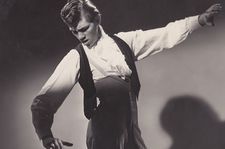 |
| Hampton Fancher: "Sometimes I doubt any of it happened." |
AKT: A last escape?
Michael Almereyda: He introduced the duende reference and it's important to be able to recognise how it reflects a lot of his adventures. He specifically refers to an essay by Lorca. That was my introduction to that word, too. Obviously he [Hampton] is borrowing from a tradition that is very deep.
And to have that applied to in the life of a Hollywood screenwriter, to recognise how complicated a character Hampton is. Because I don't think most Hollywood screenwriters have access to those sorts of references and ideas. Not to be too high-minded about it.
I wanted to show how someone who showed up in all these forgettable TV shows also was responsible for a very unforgettable movie [Ridley Scott's Blade Runner]. And the path that led up to it is kind of breathtaking.
AKT: How do you react to the film [Escapes]? How does it feel watching yourself?
HF: I feel relieved.
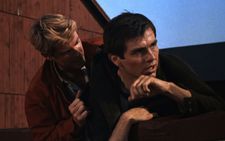 |
| Michael Almereyda on Hampton Fancher: "He specifically refers to an essay by Lorca." |
MA: Relieved?
HF: If we want to film you talking about yourself for the next 15 hours, there's a part of you that says, "Yeah, okay, I'll do that". But there's another part that says "Oh, please, what am I doing? This is idiotic." The whole time I was doing it. And it was sporadic. We would shoot for a while. We're close friends and I'm a filmmaker and I support his work. You know, it's a good endeavour.
There's an artistic club going on, kind of, and that's fine. At the same time, I didn't like a lot of what I was doing and I was embarrassed. I didn't think it would really happen. I didn't know what he was going to do. I thought it was going to just fade away and that was fine.
Then when he did it, then I thought, oh shit, this is scary. I might have to kill myself, you know. I think at one point I even said to him, if I don't like this, can we just squelch it? He was elusive.
MA: I honestly don't recall that.
HF: Then when I saw it, I was pleased that I didn't come off like a dork.
AKT: You don't.
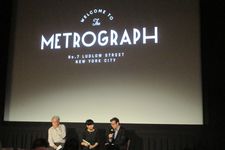 |
| Michael Almereyda with Aliza Ma and Ben Lerner In Chris Marker's Studio at Metrograph Photo: Anne-Katrin Titze |
HF: Talking about myself all the time, blowing the whistle on certain events and people. I was afraid. I like what you did. I always liked your stuff.
MA: Were you entertained?
AKT: Yes, very much. Absolutely. Did the film change your memories?
HF: Well, these stories I told Michael I've been telling for a long time. I don't know if it changed anything. Sometimes I doubt any of it happened. A perverse thing I do with myself - I got a law degree, I never was a flamenco dancer, I had a certain kind of life but I made this whole thing up. That's pretty wonderful, I like that. It's looking at my life through other people's eyes.
AKT: I was asking the memory question because when we spoke about Experimenter, you [Michael] brought up William James and secondary memories. Which is also in Marjorie Prime. The idea that you always remember the last time you remembered the thing. Is remembering a thread for you?
MA: I think it's a big part of life. It's a way we measure our experience. The idea of reality. It just seems implicit.
AKT: What I like about your films is that the form is so different every time. It is so much a part of what you are telling. There are filmmakers who put their same structure on everything.
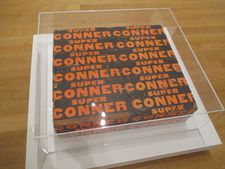 |
| Bruce Conner: It's All True exhibition at MoMA in New York Photo: Anne-Katrin Titze |
MA: It's a very flexible medium and there's a lot to talk about. This form specifically [in Escapes] has to do with re-purposing old footage and I hadn't done much of that. Even though almost all of my movies when you add them up have quotations in them. There's almost always images within images. One of my favorite fellow Kansan filmmakers is Bruce Conner. And this is my tribute to Bruce Conner.
You re-activate meanings or associations or emotions within footage by putting them together in a new way. That's part of what memory is, too. Hampton's life encouraged or allowed that, not everyone's life would. Very few people's lives would accommodate this approach. I don't want to be immodest, but I don't know of another film like it, which looks at someone's life through these multiple images.
It's a little bit like a hall of mirrors and it reflects on Philip K Dick. Because we start the movie also with the Philip K Dick quotation about counterfeit worlds. And anyone who is making movies is dealing in counterfeit worlds.
AKT: I was at the Chris Marker event at Metrograph. I liked the cat short very much. Three minutes.
MA: Cat Listening To Music.
HF: I've seen it. Someone sent it to me. God! I had thought it was maybe hokey. But I thought it was so good.
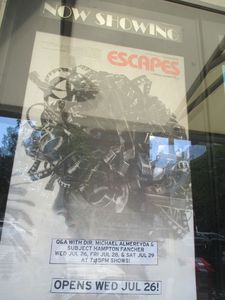 |
| Escapes poster at the IFC Center Photo: Anne-Katrin Titze |
AKT: I found interesting what you said. That you met and were in the same room with Chris Marker but because he wanted to be anonymous, you almost don't remember.
MA: It almost clouded my memory of his face, yeah. I was being a little poetic. I do remember.
HF: That's pretty good, though.
MA: You know, what I remember even more vividly is that he appears in a Wim Wenders movie, holding up a napkin in a sake bar. It's called Tokyo-Ga. It's a wonderful little touristic view of Tokyo married to a rumination about Ozu. And there's a great interview with Ozu's cameraman [Yuharu Atsuta].
HF: He is a great cameraman of what?
MA: He shot most of Ozu's movies. You don't know who Ozu is? They are usually called the three great Japanese filmmakers: Kurosawa, Mizoguchi and Ozu.
HF: Name a title!
MA: An Autumn Afternoon, Tokyo Story…
AKT: Late Spring, Equinox Flower…
MA: I'll get you some. You got a blind spot.
AKT: You have to discover him. He is wonderful.
MA: He's great, he's the poet of the mundane. He's the most Japanese and a lot of people like Jarmusch and Wenders have been leaning on him. He is amazing.
Coming up - Hampton Fancher and Michael Almereyda on Tina Sinatra, a connection to Michael Pfleghar and Jean-Pierre Léaud, Thom Andersen's Los Angeles Plays Itself, Brian Kelly and Flipper, Skinningrove on photographer Chris Killip, and "it's called Escapes for a reason as almost every episode involves a near-death experience."
Read what Hampton Fancher and Michael Almereyda had to say on Blade Runner 2049, the original Blade Runner, and Philip K Dick's Do Androids Dream of Electric Sheep?
Escapes opens today, July 26 in the US.





















